|
|
|
Sort Order |
|
|
|
Items / Page
|
|
|
|
|
|
|
| Srl | Item |
| 1 |
ID:
119254
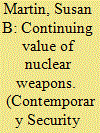

|
|
|
|
|
| Publication |
2013.
|
| Summary/Abstract |
Changes in how we think about nuclear weapons cannot strip them of their strategic value. Only a transformation of the nature of international politics or the emergence of an alternative means of strategic deterrence can do that. The structural realist analysis that I present argues that there are two basic constraints on the role that nuclear weapons play in international politics. The first constraint stems from the anarchic and competitive nature of the international system, which leads to insecurity and encourages states to acquire the most effective weapons possible as part of their quest for security. The second constraint stems from the material characteristics of nuclear weapons; these characteristics, most notably their destructive power, mean that nuclear weapons can serve as, but are also limited to the role of, a strategic deterrent. Together, these constraints mean that nuclear weapons will continue to be valued as a strategic deterrent. Any devaluing that occurs in the foreseeable future will be limited and will not extend to 'deep devaluing' and the elimination of nuclear weapons. Two common counter-arguments - lessons from chemical and biological disarmament, and the imperative from disarmament thought to stem from nuclear proliferation - do not challenge this conclusion. The key question we face is not how to devalue and eliminate nuclear weapons, but what sort of nuclear world maintains sufficient deterrence while minimizing the possibility of nuclear use.
|
|
|
|
|
|
|
|
|
|
|
|
|
|
|
|
| 2 |
ID:
119251


|
|
|
|
|
| Publication |
2013.
|
| Summary/Abstract |
Consensus amongst great powers on ballistic missile defence (BMD) may be the only way to ensure it does not undermine international security. This article applies defensive realism to explain the destabilizing effect of America's unilateral deployment of BMD. Under defensive realism, states opting for offensive strategies are punished, cooperation and reconciliation becoming more logical strategic options. The reversal of previous American policy under the Anti-Ballistic Missile (ABM) Treaty created a new security dilemma with China and Russia. Beijing and Moscow are not opposed to BMD in principle, though, and defensive realism provides a basis for improving relations, stressing joint deployment of BMD as the basis for a new paradigm of strategic relations. Defensive realism supports the conclusion that consensus amongst great powers on BMD is essential to strategic stability. It shows that the most likely alternative is worsening strategic action-reaction dynamics with unpredictable consequences. If BMD cooperation expands, however, domestic opposition will coalesce from groups with an interest in great power competition. Subsequent analysis should examine in more detail the role these groups play in influencing security policy and how they impede, or could facilitate, the emergence of BMD cooperation.
|
|
|
|
|
|
|
|
|
|
|
|
|
|
|
|
| 3 |
ID:
119248
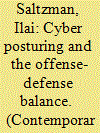

|
|
|
|
|
| Publication |
2013.
|
| Summary/Abstract |
For some realists, cyber warfare is 'old wine in new bottles', with marginal added value. This misses the larger possibilities for political/military chain reactions that cyber warfare may prompt, possibly leading to armed conflict. This article utilizes Offense-Defense theory to appraise the influence of cyber warfare on international security and the prospects for conflict. Offense-Defense theory, as applied here, better explains the relationship between technological innovation and international politics, and leads to different conclusions from other realist approaches. Redefining the Offense-Defense balance to accommodate cyberspace leads to an emphasis on the offensive advantages of cyber capabilities. The offensive and defensive cyber postures of China, Russia, the United States, and NATO are examined here to empirically assess the role of cyber warfare in security policy. Evidence shows that innovations in Information and Communication Technology (ICT) allow states to take greater risks and adopt more vigilant or offensive positions toward adversaries. Cyber capabilities do not cause armed conflict, but make decisions to escalate easier and cheaper. A strategic enabler that provides attackers greater freedom of action, cyber warfare is becoming a necessary condition for the conduct of war, even if it is not a sufficient one.
|
|
|
|
|
|
|
|
|
|
|
|
|
|
|
|
| 4 |
ID:
119250


|
|
|
|
|
| Publication |
2013.
|
| Summary/Abstract |
Is arms control becoming irrelevant? This analysis offers a new way of testing the decline of arms control. Rather than focusing on foreign policy outputs and international outcomes, this analysis examines perceptions of security policy decision makers and opinion leaders through their references to arms control. Salience and framing analysis are used to evaluate the marginalization of arms control in political communication. Empirically, the article examines selected American media coverage, research institute publications, and the Congressional Record. This research confirms a dwindling number of references to the concept of arms control over the last two decades. This trend is not explained by the emergence of new technological issues, nor does it follow the chronological pattern of actual arms control successes and failures. Rather it hints at a more fundamental transformation of political thought.
|
|
|
|
|
|
|
|
|
|
|
|
|
|
|
|
| 5 |
ID:
119252
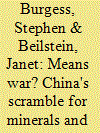

|
|
|
|
|
| Publication |
2013.
|
| Summary/Abstract |
The tendency for rising powers to seek control of resource markets is being repeated in Southern Africa, where rising powers led by China are competing for strategic minerals. This could lead to market failure, shutting out Western companies. However, competition does not mean that armed conflict will occur. The global reach of the United States is such that it can take measures short of war to guarantee the flow of minerals. China will be at a strategic disadvantage for some time in relation to the United States and cannot assert control over the flow of minerals. The Southern Africa case shows that even in the era of globalization, monopolization and nationalization of resources will still be attempted, but those efforts are likely to be countered by global forces in favour of free markets. Rising powers like China may temporarily monopolize resources found on their own territory, but strong global forces will ensure that the flow of most resources continues. Monopolization is unlikely to work outside the territory of rising powers, because they still must rely on sea lanes to transport those minerals. The United States still has the ultimate trump in its navy, which can stop the flow of resources to any would-be monopolist.
|
|
|
|
|
|
|
|
|
|
|
|
|
|
|
|
| 6 |
ID:
119247
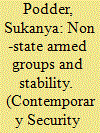

|
|
|
|
|
| Publication |
2013.
|
| Summary/Abstract |
Events such as the Arab Spring in Tunisia, Egypt, Libya, and Syria have created an urgent need for the international community to engage with a range of armed groups during and after conflict. This engagement extends beyond humanitarian, conflict resolution and counter-terrorism ends to issues of democratization and political transition of such groups in legitimate, stable, and inclusive governments. This article underlines the need to reconsider post-counter-terrorism engagement styles, which frame non-state armed groups (NSAGs) exclusively as spoilers, and stresses opportunities for state-building partnership that certain NSAGs offer. Towards this end, this article emphasizes the importance of distinguishing between different types of NSAGs, based on their sources of legitimacy, resources, reliability, and partnering potential. It concludes with four entry points that promise a strong basis for incorporating 'legitimacy, inclusion, and resource' considerations into the planning and implementation of future state-building efforts.
|
|
|
|
|
|
|
|
|
|
|
|
|
|
|
|
| 7 |
ID:
119246
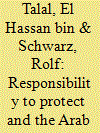

|
|
|
|
|
| Publication |
2013.
|
| Summary/Abstract |
Over the last 15 years, human rights concerns and development issues have been increasingly integrated with security matters on the international agenda. There is a growing understanding that justice, growth in welfare, and sustainable peace are goals that are deeply entwined. This new understanding of development - as encompassing human rights and security concerns to an equal extent - is reflected in the notion of the responsibility to protect. The responsibility to protect (R2P) represents a holistic approach to the challenges of international security, and one that enables human rights violations to be conceived of as a security issue. The arms embargo and humanitarian intervention in Libya and subsequent debate over intervention in Syria brought the issues of R2P into the heart of the Arab world. The Arab world has long been immune to these debates, but the historic changes in Tunisia and Egypt and the humanitarian intervention in Libya have shifted the debate and brought about a paradigm shift.
|
|
|
|
|
|
|
|
|
|
|
|
|
|
|
|
| 8 |
ID:
119255
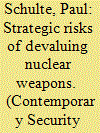

|
|
|
|
|
| Publication |
2013.
|
| Summary/Abstract |
This article surveys the emerging field of meaning represented by 'nuclear devaluation', and the arguments likely to be publicly or privately articulated against it by the elites of nuclear capable states, reaching judgements through the prism of their own strategic cultures in relation to their own national and regime interests. These judgements will be informed by different, often unstated, assumptions about the value of nuclear weapons, particularly the intangible, strategically shaping effects of nuclear capabilities on the peacetime strategic landscape. Political pressures for some form of devaluation will continue, especially within nuclear weapon states concerned to limit further damage to the NPT regime. But devaluation falling short of disarmament will be hard to prove, difficult for other states to rely upon, particularly unappealing to authoritarian regimes, and potentially reversible, while its essential appeal to strategically influential constituencies will be circumscribed by cultural and geostrategic factors. Managing the consequences of unevenly distributed aspirations towards devaluation will nevertheless represent a growing complexity for Western nuclear diplomacy.
|
|
|
|
|
|
|
|
|
|
|
|
|
|
|
|
| 9 |
ID:
119253


|
|
|
|
|
| Publication |
2013.
|
| Summary/Abstract |
Nuclear weapons remain deeply embedded not only in strategic thinking and force postures, but also in our political cultures in ways that assign multiple, powerful socio-political values to the bomb. Progress towards nuclear zero will necessarily require peeling away the layers of value to the point where it becomes politically, strategically, and socially acceptable to permanently relinquish a nuclear capability. The concept and process of devaluing nuclear weapons is contested. It is a broad concept that covers notions of reducing the role, delegitimizing, reducing the salience, and marginalizing nuclear weapons in the declaratory and operational policies of the nuclear powers. This article argues that to understand what a process of devaluing might look like, we first need a deeper understanding of how nuclear weapons are valued. To achieve this, the article moves through four stages. First, it provides an overview of the lexicon of devaluing and subsidiary terms in global nuclear discourse since the end of the Cold War. Second, it discusses how we know nuclear value and its discursive construction. Third, using the United Kingdom as a case study it explores the 'regime of value' in which British nuclear weapons are embedded and the implications for devaluing. Finally, it reflects on William Walker's notion of 'responsible nuclear sovereignty' and the tensions at the nexus of deterrence/devaluing.
|
|
|
|
|
|
|
|
|
|
|
|
|
|
|
|
|
|
|
|
|